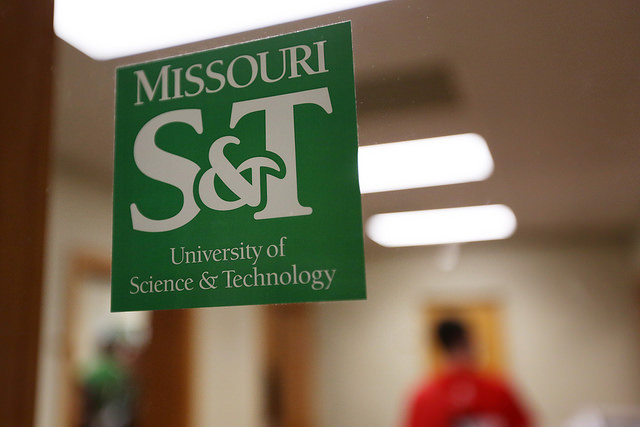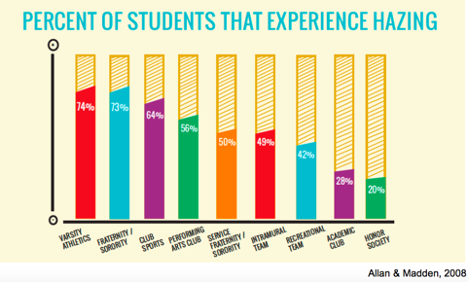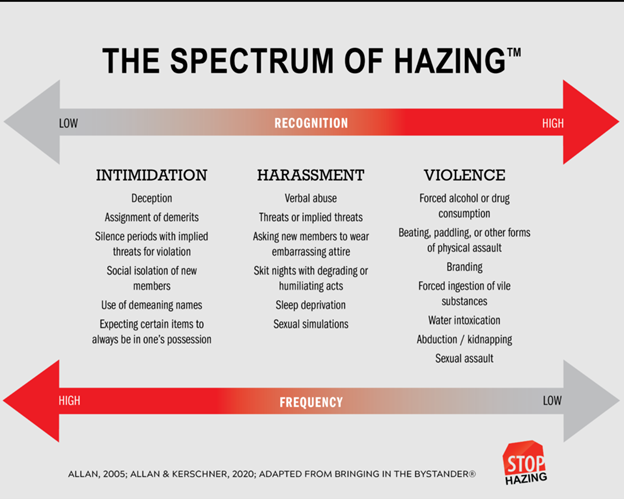What Is Hazing?

Missouri S&T is committed to providing a safe educational environment for everyone and does not tolerate hazing by any group or individual affiliated with the University.
Hazing encompasses practices that threaten not only physical safety and psychological well-being but undermine the ethical, inclusive, and supportive environment essential for belonging and success.
Hazing is prohibited under state law and University policy. The University will take disciplinary action for hazing incidents that have a substantial connection to the interests of the University, regardless of where they occur.
Fact: 90% of students who experience hazing do not consider themselves to have been hazed. Source: National Study of Student Hazing

- Examples
- University Policy
- Missouri Law
- Federal Law
- StopHazing.org
- Piazza Center
- The Spectrum of Hazing
- Quick litmus test...
- Recognizing Hazing
Examples
Examples of hazing
Joining a group should never involve:
- sleep deprivation
- consumption of vile substances
- skits and demeaning acts
- isolation from the group
- acts of servitude
- expecting certain items to always be in one's possession
- pressured or forced alcohol or drug consumption
- acts of exertion above reasonable risk
Recognizing Hazing Flowchart
Context matters
Note: while some behaviors constitute hazing regardless of context (e.g., paddling, use of alcohol), others depend on the circumstances. For example, requiring athletes to perform normal calisthenics as part of conditioning would not be hazing, but requiring new members of a non-athletic student organization to do push-ups in the middle of the night would constitute hazing.
Hazing can result in a range of sanctions against organizations/teams and individuals that range from educational interventions to withdrawal of recognition, suspension, or expulsion.
University Policy
University of Missouri Standard of Conduct
Section 200.010(C)(19) - Hazing, defined as any intentional, knowing, or reckless act committed (whether individually or in concert) against another person or persons regardless of the willingness of such other person or persons to participate, that:
- Is committed in the course of an initiation into, an affiliation with, or the maintenance of membership in a group or organization; and
- Causes or creates a risk, above the reasonable risk encountered in the course of participation in the University or the organization (such as the physical preparation necessary for participation in an athletic team), of physical or psychological injury, including:
- Whipping, beating, striking, electronic shocking, placing of a harmful substance on someone’s body, or similar activity;
- Causing, coercing, or otherwise inducing sleep deprivation, exposure to the elements, confinement in a small space, extreme calisthenics, or other similar activity;
- Causing, coercing, or otherwise inducing another person to consume food, liquid, alcohol, drugs, or other substances;
- Causing, coercing, or otherwise inducing another person to perform sexual acts;
- Any activity that places another person in reasonable fear of bodily harm through the use of threatening words or conduct;
- Any activity against another person that includes a criminal violation of local, State, Tribal, or Federal law; and
- Any activity that induces, causes, or requires another person to perform a duty or task that involves a criminal violation of local, State, Tribal, or Federal law.
Important Note: Failure by a group's or organization's executive officers to intervene to prevent, discourage, and/or report hazing of which they are aware or reasonably should be aware also will be deemed a violation of this policy.
Missouri Law
Missouri Anti-Hazing Law
All members of the University community, including student organizations and individual students, must comply with Missouri State Law, known as Danny's Law (RSMo 578.365). This law makes it a criminal offense to knowingly participate in, plan or encourage hazing acts that recklessly endangers the mental or physical health or safety of any individual seeking to join, maintain membership in or formerly affiliated with a sanctioned organization.
We encourage all community members to familiarize themselves with the protections and responsibilities outlines in Danny's Law.
Key Points
- Applied to conduct on or off campus
- Consent is not a defense
- Executive officers who fail to intervene, discourage, or report hazing may also be held responsible
- Violations may result in a Class A misdemeanor or a Class D felony
- May provide legal immunity for those who call for emergency assistance or render aid during a hazing incident
§ 578.365. Hazing — consent not a defense — penalties.
1. A person commits the offense of hazing if he or she knowingly participates in or causes a willful act, occurring on or off the campus of a public or private college or university, directed against a student or a prospective member of an organization operating under the sanction of a public or private college or university, that recklessly endangers the mental or physical health or safety of a student or prospective member for the purpose of initiation or admission into or continued membership in any such organization to the extent that such person is knowingly placed at probable risk of the loss of life or probable bodily or psychological harm. Acts of hazing include:
(1) Any activity which recklessly endangers the physical health or safety of the student or prospective member, including but not limited to physical brutality, whipping, beating, branding, exposure to the elements, forced consumption of any food, liquor, drug or other substance, or forced smoking or chewing of tobacco products;
(2) Any activity which recklessly endangers the mental health of the student or prospective member, including but not limited to sleep deprivation, physical confinement, or other extreme stress-inducing activity; or
(3) Any activity that requires the student or prospective member to perform a duty or task which involves a violation of the criminal laws of this state or any political subdivision in this state.
2. Public or private colleges or universities in this state shall adopt a written policy prohibiting hazing by any organization operating under the sanction of the institution.
3. Nothing in this section shall be interpreted as creating a new private cause of action against any educational institution.
4. Consent is not a defense to hazing. Section 565.010 does not apply to hazing cases or to homicide cases arising out of hazing activity.
5. The offense of hazing is a class A misdemeanor, unless the act creates a substantial risk to the life of the student or prospective member, in which case it is a class D felony.
Federal Law
The Stop Campus Hazing Act requires reporting and transparency regarding hazing incidents involving recognized student organizations. It improves hazing reporting and prevention on college campuses. This evidence-informed law is supported by national campus safety experts, national fraternity and sorority trade associations, and the parents of hazing victims. Read the Law
StopHazing.org
Definition of Hazing: any activity expected of someone joining or participating in a group that humiliates, degrades, abuses, or endangers them regardless of a person’s willingness to participate.
It includes three key components:
-
It occurs in a group context
-
Humiliating, degrading, or endangering behavior
-
It can happen regardless of an individual’s willingness to participate; regardless of consent
Piazza Center
Hazing is a power dynamic behavior aimed at screening, fostering bonds, or establishing standing in organizations that risks the health and safety of individuals, causing deliberate or unforeseen physical and/or emotional harm counter to organization purposes. Citation: Piazza Center. (2024). Comprehensive hazing definition: Motivations, mechanisms, antecedents, and effects.
Timothy J. Piazza Center for Fraternity and Sorority Research
The Spectrum of Hazing
Quick litmus test...
Would you feel comfortable telling a relative or a future employer that you had participated in the activity in question? If not, consider making a hazing report.
Recognizing Hazing
Policy & Prevention Statement
Read Missouri S&T's anti-hazing policy and prevention statement online

